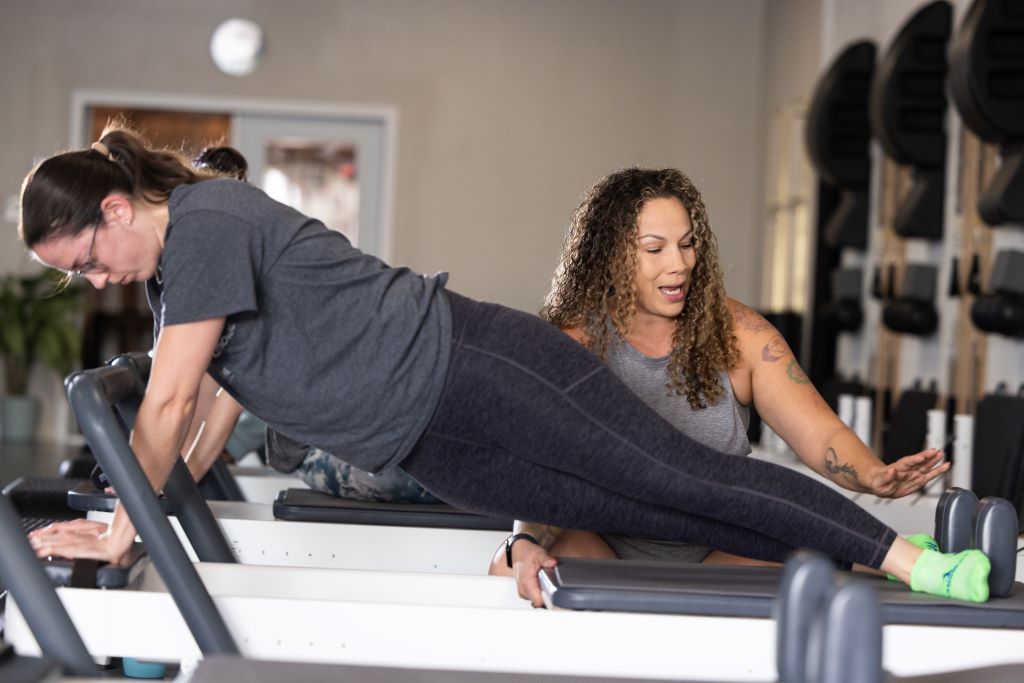
Introduction: Are All Pilates Instructors the Same?
Have you ever taken a Pilates class and wondered about your instructor’s qualifications? You’re not alone. With Pilates growing in popularity, the number of self-taught, partially trained, or unqualified instructors is rising—especially on social media and in fitness studios that don’t vet certifications.
Here’s the truth: Not all Pilates instructors are created equal. Choosing a certified Pilates teacher isn’t just about credentials—it’s about your safety, your progress, and your experience.
Why Does Pilates Instructor Certification Matter?
- Certified instructors complete hundreds of hours of anatomy, technique, practice teaching, and observation.
- They learn how to teach with proper cueing, spotting, and body mechanics.
- They know how to modify for injuries, prenatal clients, older adults, or athletes.
- Non-certified instructors may lack this depth of training—and can inadvertently cause harm or hinder your progress.
Think of it like choosing a surgeon. Would you want someone who watched a few YouTube videos—or someone who completed medical school?
What Are the Types of Pilates Certifications?
- Mat Certification (Mat 1–3)
- Focuses on classical and contemporary mat exercises done on the floor.
- Covers anatomy, breath work, cueing, and progressions.
- Typical Duration: 100–250 hours (includes training, observation, and practice teaching).
- Best for: Group class instructors in gyms, studios, or private home settings.
- Reformer Certification (Reformer 1–3)
-
- Includes Pilates exercises on the reformer machine (a spring-based resistance system).
- Emphasizes safety, modifications, and sequencing.
- Typical Duration: 150–350 hours
- Best for: Studio instructors who teach on equipment in private or group settings.
- Comprehensive Certification (500+ Hours)
-
- Includes Mat, Reformer, Cadillac (Trapeze Table), Chair, Ladder Barrel, and more.
- Also includes anatomy, movement principles, practice teaching, assistant teaching, mentorship and final assessment.
- Typical Duration: 450–600+ hours
- Best for: Career Pilates professionals or anyone planning to teach across apparatuses in clinical or professional studios.
What About Xformer or Megaformer Certifications?
You may have seen Xformer™ or Megaformer™ classes on Instagram or in trendy fitness studios.
Here’s how they differ:
- These are fitness hybrid machines, inspired by Pilates but not part of classical training.
- Most certifications for these machines are short (1–3 days) and do not include in-depth anatomy, rehab training, or comprehensive education.
- These workouts are often high-intensity and focus on burn, not alignment or longevity.
Be cautious: Not all Xformer and Megaformer instructors are Pilates certified—even if they use Pilates terminology.
How Long Does It Take to Become a Certified Pilates Instructor?
Becoming truly certified isn’t a weekend process. It takes:
- Months of study and movement training
- Self-practice + teaching practice
- Observation hours under mentors
- Passing a practical and written test-out
- Huge investment in their education ave $5000-$10,000
Comprehensive programs take 6–12 months depending on your pace.
How to Spot a Qualified Pilates Instructor
Look for these signs of a well-trained, certified teacher:
They mention where they trained (e.g., Balanced Body, Polestar, Stott, Basi)
They completed at least 300–500 hours of training
They continue mentorship or continuing education
They cue clearly and correct form safely
They can modify for special populations: pregnancy, injury, or special needs
Be cautious if an instructor:
- Brags about being “self-taught” or “intuitive only”
- Doesn’t know anatomy or how to cue alignment and posture
- Rushes through sequences without correcting form and it’s more like choreography and does’t know the “why” or the purpose of an exercise
- Has no website, certifying school, or credentials listed
- Has little to no experience teaching
Questions to Ask Your Pilates Instructor:
- What Pilates school or organization certified you?
- How long have you been teaching? Studying Pilates?
- How many hours of training did you complete?
- Do you offer modifications for injuries or pregnancy?
- Are you comprehensively certified, or just mat/reformer?
- Do you work with a mentor or pursue continuing education?
The Bottom Line: Prioritize Certified, Comprehensive Education
Your body deserves safe, informed movement. At Soteria Pilates, our instructors are comprehensively trained, mentored, and certified through over 350-500+ hours of education, including anatomy, special populations, and live teaching assessments.
Whether you’re just starting or deepening your Pilates journey, don’t settle for less than expertise.
Interested in Becoming Certified Yourself?
We offer:
- Modular certification options (Mat, Reformer, etc.) pay as you go on your time module by module.
- 250 Hour Mat/Reformer Certification bundle with Pilates Foundations/Anatomy/Kinesology (mentorship extra cost)
- Full 500-hour comprehensive program with immersive teaching and mentorship included ($1249 value)
- Training at both our Maitland and Winter Garden studios
Learn More About Our Teacher Training Program
Book a Free Consultation: Email us at info@soteriapilates.com
FAQ Section
Q: Is mat certification enough to teach full-time?
A: Mat certification is a great start, but you’ll likely need reformer or full comprehensive training to work in professional studios and to earn more income
Q: How do I know if a program is reputable?
A: Look for studios and schools affiliated with Pilates Method Alliance (PMA) or long-standing institutions like Balanced Body, Polestar, or Stott.
Q: Why you should stay away from 100% Online Programs, Why are programs so expensive and does it really matter who you get your certificate from?
A: Yes, it absolutely matters. In Pilates teacher training, you get what you pay for. Lower-cost or 100% online programs often skip essential components like mentorship, hands-on equipment training, and supervised teaching. The quality of your education directly affects the kind of instructor you become.
More importantly, who you learn from shapes how you teach. A skilled, experienced master trainer provides the nuance, feedback, and accountability you can’t get from watching videos alone. At Soteria Pilates, we believe in high-touch, high-quality education that prepares you to teach with confidence, competence, and credibility.


